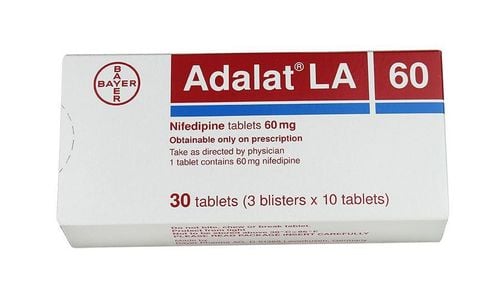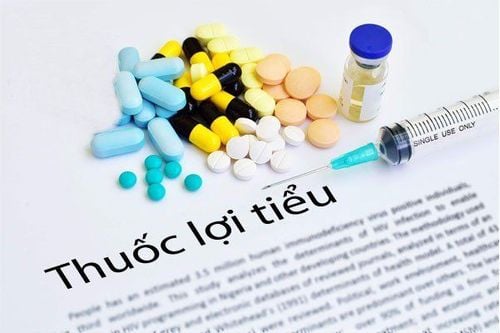This is an automatically translated article.
Hypertension is an extremely common disease today, treatment regimens often prioritize a combination of drugs to increase blood pressure control. A combination product between two groups of antihypertensive drugs Methyldopa and Hydrochlorothiazide called Aldoril is often prescribed by doctors in outpatient prescriptions. So what is Aldoril?
1. What is Aldoril?
Aldoril medicine contains the main active ingredients Methyldopa and Hydrochlorothiazide which are used orally. Drug class: CNS depressants (Methyldopa) and thiazide diuretics (Hydrochlorothiazide). The combination product Methyldopa and Hydrochlorothiazide is used to treat high blood pressure (hypertension).
High blood pressure adds to the workload of the heart and arteries. If high blood pressure continues for a long time, the heart and arteries may no longer work properly. This can damage blood vessels in the brain, heart, and kidneys, leading to stroke, heart failure, or kidney failure. High blood pressure can also increase the risk of a heart attack. These problems may be less likely if blood pressure is kept under control.
Methyldopa works by controlling nerve impulses that dilate blood vessels so that blood flows more easily. Hydrochlorothiazide helps reduce the amount of water in the body by increasing urine output. These mechanisms help people taking Aldoril lower their blood pressure. The drug Aldoril is used according to the doctor's prescription.
2. Precautions before using Aldoril
When deciding to use a drug, the risks of taking the drug must be weighed against the benefits it offers. For the drug Aldoril, the following should be considered:
2.1. Allergies Tell your doctor if you have ever had any unusual or allergic reaction to Aldoril or any other medicines.
2.2. Pediatrics Although there is no specific information comparing use of Aldoril in children with use in other age groups, Aldoril is not expected to cause side effects or problems in children. children compared to adults.
2.3. Geriatric Dizziness or lightheadedness, drowsiness, or signs of too much potassium loss may be more likely to occur in the elderly, who are sensitive to the side effects of methyldopa and hydrochlorothiazide.
2.4. Lactation: Hydrochlorothiazide: There are no adequate studies in women to determine the risk to the infant when used during breast-feeding. Weigh the potential benefits against the possible risks before taking Aldoril while breastfeeding.
Methyldopa: Studies in women suggest that the drug poses little risk to the infant when used during breast-feeding.
3. Interactions with Aldoril
Aldoril is not recommended with any of the following medicines, the doctor may decide not to treat Aldoril or change some of the other medicines the patient is taking:
Brofaromine; Clogyline; Dofetilide; Furazolidone; Iproniazid; Isocarboxazid; Lazabemide; Linezolid ; Moclobemide; Nialamide; Pargyline; Phenelzine; Procarbazine; Rasagiline; Selegiline; Toloxatone; Tranylcypromine. Using Aldoril with any of the following medicines is generally not recommended, but may be indicated in some cases, if both medicines are prescribed together, your doctor may change the dose or frequency frequency of using one or both drugs.
Aceclofenac; Acemetacin; Acetyldigoxin; Amphetamine; Amtolmetin Guacil; Arsenic trioxide; Aspirin; Benzphetamine; Bromfenac; Bufexamac; Celecoxib; Choline Salicylate; Clonixin; Deslanoside; Desmopressin; Dexibuprofen; Dexketoprofen; Dextroamphetamine; Diclofenac; Diflunisal; Digitalis; Digitoxin; Digoxin; Dipyrone; Droperidol; Droxicam; Entacapone; Etodolac; Etofenamate; Etoricoxib; Felbinac; Fenoprofen; Fepradinol; Feprazone; Flecainide; Floctafenine; Hydrofluoric acid; Flurbiprofen; Ibuprofen ; Indomethacin; Iobenguane I 131; Ketanserin; Ketoprofen; Ketorolac; Levomethadyl; Lisdexamfetamine; Lithium; Lornoxicam; Loxoprofen; Lumiracoxib; Meclofenamate; Mefenamic acid; Meloxicam; Methamphetamine; Methotrexate ; Metildigoxin; Morniflumate; Nabumetone; Naproxen; Nepafenac; niflumic acid; Nimesulide; Nimesulide Beta Cyclodextrin; Ouabain; Oxaprozin; Oxyphenbutazone; Parecoxib; Phenylbutazone; Piketoprofen; Piroxicam ; Porfimer; Proglumetacin; Propyphenazone; Proquazone; Proscillaridine; Pseudoephedrine; Rofecoxib; Salicylic acid ; Salsalates; Sodium Salicylate; Sotalol; Sulindac; Tenoxicam; tiaprofenic acid; Tolfenamic Acid; Tolmetin; Valdecoxib. Using Aldoril with any of the following medicines may increase the risk of some side effects, but using both medicines may be the best treatment for the patient, so if both medications are prescribed together, your doctor may change the dose or frequency of using one or both of the following:
Alprenolol; aminolevulinic acid; Bepridil; Bisoprolol ; Carbamazepine; Cholestyramine; Ferric ammonium citrate; Gossypol; Haloperidol ; Iron; Phenylpropano;lamine; Sotalol; Timolol; Topiramate.
4. Other unwanted medical problems
The presence of other medical problems that may affect the use of Aldoril :
Angina : Methyldopa may worsen the condition; Type 2 diabetes: Aldoril may change the amount of diabetes medicine needed; Gout (or history): Hydrochlorothiazide can increase the amount of uric acid in the blood, which can lead to gout; High cholesterol: Hydrochlorothiazide may increase blood cholesterol levels; Kidney disease: The effects of methyldopa and hydrochlorothiazide may be increased due to a slower elimination from the body. If severe, hydrochlorothiazide may not work; Liver disease: The effects of methyldopa may be increased due to a slower elimination from the body. If hydrochlorothiazide causes too much water loss in the body, liver disease can become much worse; Lupus erythematosus (history): Hydrochlorothiazide may aggravate the patient's condition; Mental depression (history): Methyldopa can cause mental depression; Pancreatitis; Parkinson's disease: The active ingredient Methyldopa in Aldoril may worsen the condition.
5. Use Aldoril correctly
In addition to using Aldoril prescribed by a doctor, appropriate treatment for high blood pressure also includes weight control and attention to nutrition, especially foods or drinks that contain a lot of blood. sodium. Your doctor will tell you which factors are most important to you.
Many patients with high blood pressure will not notice any signs of a hypertension problem, so many may feel fine. That's why it's important that you take your medicine exactly as directed and keep your doctor's appointments even if you feel well. Remember that Aldoril will not cure high blood pressure, but it will help control it. Therefore, you must continue to take Aldoril as directed if you want to lower your blood pressure and keep it low. If high blood pressure is left untreated, it can cause serious problems such as heart failure, blood vessel disease, stroke, or kidney disease.
Aldoril may cause patients to feel unusually tired when they start taking it and notice an increased amount of urine or frequency of urination. After taking the medicine for a while, these effects should lessen.
If the doctor prescribes to use only 1 dose a day, take Aldoril in the morning after breakfast; If more than 1 dose must be taken per day, take the last dose no later than 6 p.m. unless otherwise directed by your doctor. To help patients remember to take their medication, try to get in the habit of taking Aldoril at the same time each day.
6. Dosage of the drug Aldoril
Dosage of Aldoril to treat high blood pressure for oral dosage form (tablets):
Adults: 2 to 4 tablets a day, taken once or in divided doses. Children: Aldoril dosage must be determined by a doctor.
7. Precautions while using Aldoril
The treating doctor needs to see the patient, then check the progress of the treatment to make sure that Aldoril is working properly.
Aldoril can cause potassium loss, to prevent the doctor may recommend the following measures:
Add foods with high potassium content such as oranges or citrus juices; Supplement preparations containing potassium; Use a medication to prevent potassium loss in the first place. It is important for the patient to follow the doctor's instructions. In addition, patients should not change their diet on their own, especially if they are on a special diet, are taking potassium supplements or taking medications to prevent potassium loss. Potassium supplements may not be necessary and in some cases lead to harm. Contact your doctor if you have severe vomiting or diarrhea as these symptoms can cause dehydration and loss of potassium.
If you are taking Aldoril and your fever cannot be found, contact your doctor to be checked, especially during the first few weeks of taking Aldoril because fever can be a sign of a serious reaction to Methyldopa.
Aldoril can cause drowsiness or impaired alertness, the risk is higher in people who are just starting to take it or have just increased the dose of the drug. This reaction may affect your ability to drive, use machines, or do potentially hazardous work while not fully alert.
Dizziness, lightheadedness or fainting may occur in people treated with Aldoril, especially when changing positions. Therefore, the patient should pay attention to change position slowly and if the condition is more serious, contact a doctor for treatment.
For patients with diabetes, Aldoril can increase blood sugar. Therefore, people with diabetes should check their blood sugar or urine sugar regularly.
Hydrochlorothiazide may make your skin more sensitive to the sun. Even short-term exposure to sunlight can lead to rashes, itching, redness, skin discoloration, or severe sunburn. Therefore, when starting to use Aldoril, patients should note the following issues:
Limit direct exposure to sunlight, especially from 10 am to 3 pm; Wear protective clothing and sunglasses when outdoors; Use a sunscreen with a skin protection factor (SPF) of at least 15.
8. Side effects of the drug Aldoril
During the use of Aldoril, patients may experience some side effects as follows:
Unexplained fever appears right after starting taking Aldoril; Manifestations of severe hypokalemia; Dry mouth; Increased thirst; Irregular heartbeat; Muscle cramps or pain; Nausea or vomiting; unusual tiredness or weakness; Weak pulse; Mental weakness or anxiety; Sleep or have nightmares; Cough or hoarseness; Dark urine; Diarrhea; Joint pain, lower back pain or pain on one side of the back; Painful or difficult urination; Pale stools, yellow skin, yellow eyes; Decreased sexual ability or decreased sexual interest. Aldoril contains the active ingredients Methyldopa and Hydrochlorothiazide. The drug is used to treat high blood pressure. To ensure effective use and avoid side effects, users need to strictly follow the instructions of a doctor, professional pharmacist.
Follow Vinmec International General Hospital website to get more health, nutrition and beauty information to protect the health of yourself and your loved ones in your family.
Please dial HOTLINE for more information or register for an appointment HERE. Download MyVinmec app to make appointments faster and to manage your bookings easily.













